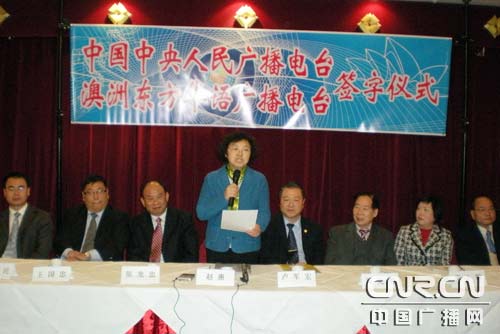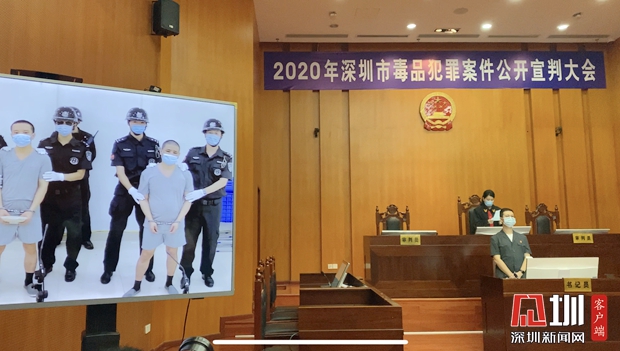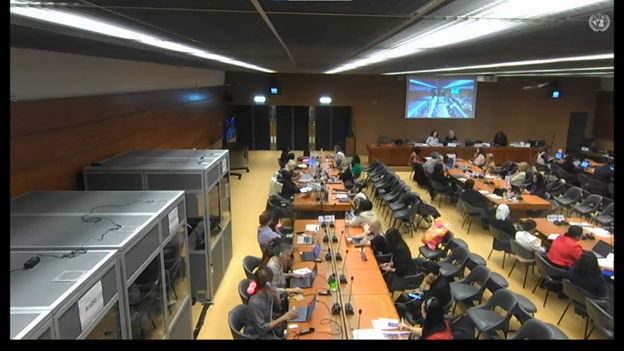 |
| Junhong Lu giving the “Grand Dharma Talk” in Singapore’s National Stadium in 2017. Image credit: Ginny Gray / CC BY-SA 4.0 |
In March 2022, Dui Hua released a study titled “The Persecution of Unorthodox Religious Groups in China” identifying 41 religious groups whose members are at risk of arrest and imprisonment. Dui Hua has since uncovered another unorthodox religious group called Xinling Famen (心灵法门) that is facing similar repression. Other recently uncovered unorthodox groups include Corporate Christ (团体基督), which is thought to have splintered from the Church of Almighty God (全能神), and the House of Joseph (约瑟家), which originated from the Spirit Church (灵灵教).
Xinling Famen, also known as the Guanyin Citta Dharma Door, is among the newly emerged Buddhist groups which have gained traction in China and overseas. Its founder Lu Junhong (卢军宏, aka Richard Lu) was born in 1959 in Shanghai, studied in Sydney, and eventually obtained Australian citizenship. After graduating from university in the 1990s, Lu promoted Buddhism and traditional Chinese culture while serving as a director of Australia Oriental Media Group, a Chinese-language radio station operated in Sydney. In 2010, Lu founded Xinling Famen. The group has gained popularity among Chinese immigrants in the United States, Canada, Europe, and Southeast Asia.
According to public statements made by Chinese government agencies, Xinling Famen has attracted three million followers. The group, however, claims to have as many as seven million members worldwide, and hundreds of thousands tune in daily to listen to Lu’s ideas online. Lu’s teachings were reportedly introduced to China in 2009, one year before the group was founded.
Unorthodox Buddhism
While Xinling Famen describes itself as a Buddhist group, its worship style is similar to that of some Pentecostal churches and charismatic healing cults, according to Chinese Religions Going Global. Adherents are said to burst into tears with their arms outstretched as Lu performs spiritual healing. Lu instructed his followers to read different combinations of sutras from Buddhist canons known as “little houses” to get rid of bad karma. He also provided a list of specific rules that followers must abide by in order to maximize good karma.
Nevertheless, China’s anti-cult propaganda accuses Lu of appropriating Buddhist terms to mobilize a cultic movement centered on his personality. Lu called himself a reincarnation of Guanyin Bodhisattva and said that he had divine power to read one’s totems (referring to Chinese zodiac signs) in heaven and see a person’s past, present, and future. Lu is also said to have amassed a fortune by selling “little houses” and charging exorbitant apprenticeship fees. China imposed an entry ban on Lu before he passed away from illness in November 2021.
Xinling Famen also stirred up controversy overseas. Buddhist communities from Singapore, Malaysia, and Hong Kong have claimed that Lu’s healing power is a complete fabrication and that his so-called divine power deviates from mainstream Buddhist ideology. Despite the controversy, China remains the only place in the world where Xinling Famen members are arrested and imprisoned.
Promoting the “Chinese Dream”
Lu’s Australia Oriental Media Group (AOMG) had an intricate relationship with Chinese state media in its infancy. Prior to the radio station’s official launch in December 2007, state media including China News Service lauded it as a new force of the ever-expanding Chinese language media in Australia and the first such radio station operated in Sydney established by a mainland Chinese immigrant. Less than two years later, in the summer of 2009, China National Radio (CNR) announced that it had signed a content collaboration agreement with AOMG, under which AOMG would broadcast some CNR regular programs and conduct local interviews for CNR special programs.
 |
| Agreement signing ceremony between CNR and AOMG on July 4, 2009, in Sydney. Zhao Hui, then vice president of CNR (standing) and Lu (seated left of Zhao) attended. Image credit: CNR |
In October 2013, Lu and Xinling Famen appeared in an interview profile conducted by a former People’s Daily correspondent for Aust333, another Chinese-language media outlet based in Sydney. The profile mentioned that Lu received a “British Community Honours Award” in 2012, repeating Lu’s false claim that it was awarded by the UK House of Lords. In fact, the award is given by a UK-registered charity that holds the ceremony at the House of Lords. The profile also praised Lu for promoting Chinese culture through his radio station and his Buddhist organization.
The interview ended by asking Lu how Xinling Famen would contribute to Xi Jinping’s idea of the “Chinese Dream.” Lu responded with talking points typically seen in Chinese propaganda, saying that the realization of the dream was “of greater and far-reaching significance to those of us overseas Chinese living overseas and leaders of overseas Chinese circles” and that “only when the country is strong, we overseas Chinese will be prouder and not be bullied.” He further stated that realizing the dream “requires the selfless dedication of Chinese people all over the world” and closed by discussing Xinling Famen’s recent event in Taiwan as an example of how the organization could promote cross-Strait understanding and would contribute to the realization of the “Chinese Dream.”
 |
| Lu (second from left) with a group of Chinese delegates during a visit to Sydney: Zhan Yannong (third from left), then president of People’s Daily; Ambassador Li Huaxin (fifth from left), then Chinese Consul General in Sydney, and Xue Meng (far right), then head of People.cn Australia. Date unknown. Image credit: Aust333 |
Within two years of the interview, the relationship had soured. State Media started to label Xinling Famen as a cult, Lu’s books were banned, and his dubious awards came into question.
Conviction under Article 300
The first known case of imprisonment involving Xinling Famen was concluded in Inner Mongolia in 2015. The Ewenki Minority Autonomous Banner People’s Court convicted a woman surnamed Meng of “organizing a cult to undermine implementation of the law,” and gave her to a suspended sentence of three years. This is the only case with information in Dui Hua’s Political Prisoner Database in which a Xinling Famen member was convicted of Article 300.
The court judgment stated that Meng converted to Xinling Famen in July 2014. In December, police searched her home and found 133 “cultic” books and 37 copies of CD-ROMS she stored in a refrigerator and a cupboard. That same month, police confiscated 100 copies of publicity materials that Meng was preparing to mail out from a supermarket.
The punishment in this case is considered lenient because Meng admitted her guilt. The court mitigated her prison sentence also because the books and publicity materials had not yet been publicly circulated.
Illegal Business Activity Convictions
Dui Hua has obtained three more court judgments involving Xinling Famen members. They were convicted not of Article 300, but of conducting illegal business activity which is typically used against the printing of the Bible and other religious publications. The three cases were all concluded in December 2016.
In the first case, five Xinling Famen members received criminal punishment ranging from suspended sentences to five years in prison in Neixiang County, Henan, for printing 101,480 copies books worth ¥276,494. Although the publishing company owned by one of the defendants only made a profit of ¥28,480, the court ordered that each of the defendants pay a fine of ¥30,000.
Table 1. Criminal punishment for Xinling Famen members
The longest prison sentence of five years was given to Zhang Jianping, an apprentice of Lu Junhong. He admitted to printing books without a license. He stated in his defense that his original intent was to promote Buddhism and guide people towards a good path. He pleaded for leniency because his books were not reactionary, nor did he intend to profit from them financially. Guo Hui (郭辉), considered another principal offender in the case, received a four-year prison sentence. All the defendants have completed their prison sentences as of this writing.
The second case, also concluded in Neixiang County, involved three defendants: Wang Xiaoyan (王小燕), Xia Songzhi (夏松芝), and Li Kehua (栗克华). Only Wang was known to be an adherent of Xinling Famen; she completed a five-year prison sentence on January 5, 2021. She received a remittance of over ¥300,000 from Xinling Famen members across China and entrusted Xia and Li to print 154,230 copies of books.
Xia and Lu were the print shop owners and each of them received a suspended sentence of three years. Available sources did not state whether Xia and Lu were members of Xinling Famen.
 |
| A screenshot of Xinling Famen materials offered through the organization's website. Image credit: Xinling Famen eBooks |
The third case in Taiyuan, Shanxi only involved one male defendant. Liu Shuangjian (刘双建), also a printshop owner, was accused of printing 13,260 copies of Xinling Famen sutras and 3,780 copies of Buddhist books which were not related to Xinling Famen. The Taiyuan Intermediate People’s Court ruled that only the Xinling Famen sutras, but not the Buddhist books, were illegal. Liu received a ¥5,000 down payment for the order to print the Xinling Famen sutras. The standard of conviction does not necessarily require an intent to establish a profitable business, but in this case the court did not accept the other Buddhist books he printed as evidence because he did not gain any profit from them. Assuming Liu served his full term without a sentence reduction, Liu was released from prison on July 15, 2018.
Arrests & Prosecutions
Dui Hua’s research into legal documents also found three cases involving Xinling Famen illegal religious books. The fate of these individuals remains uncertain because Dui Hua is unable to confirm whether they were convicted and given fixed-term prison sentences.
In December 2016, Zhao Kun (赵坤) and Guo Hongmei (郭红梅) were prosecuted for illegal business activity in Tongshan District, Jiangsu. Zhao was accused of printing 30,000 volumes of Xinling Famen books worth approximately ¥60,000, while Guo allegedly printed 20,000 copies also worth around ¥60,000.
Evidence suggests that Xinling Famen has made inroads with Chinese ethnic minorities. A Hui mother surnamed Ma and her son surnamed Han were indicted in Ji’nan, Shandong, also for illegal business activity on May 17, 2018. The prosecutors alleged that they sold 175,467 copies of Xinling Famen books worth ¥534,889.85 in the 14 months since May 2016. When the duo was detained on July 4, 2017, police also discovered 103,838 copies of Buddhism in Plain Terms, a book authored by Lu Hongjun, in their residence, storeroom, factory, and vehicles. Given the large number of publications which had been in public circulation, they are unlikely to have been given lenient punishment.
 |
| An outreach event in Malaysia. Image credit: Guan Yin Citta Dharma Buddhism Twitter account |
In the third case, Fan, a Han Chinese who resided in Urumqi, was criminally detained for “gathering a crowd to disturb social order” on June 25, 2020, but the charge was changed to Article 300 on July 9. The indictment stated that Fan organized an illegal religious activity for Krishna, a major deity in Hinduism. Police found in his residence 127 copies of Yuandun Famen propaganda and six “cultic” Xinling Famen publications. (Yuandun Famen 圆顿法门 is another unorthodox Buddhist group which has been banned by the Chinese government since December 1999). Available sources did not explain a connection between Xinling Famen and the Hindu deity.
The cases discussed in this post indicate that Xinling Famen members accused of printing and selling religious books written by Lu Hongjung face criminal charges, including violating Article 300 and illegal business activity. These cases likely only represent a small portion of criminal cases, and Dui Hua believes that many more Xinling Famen members may have been prosecuted and sentenced in China, the only place in the world which criminalizes this unorthodox Buddhist group.

































